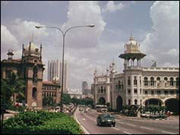August 3
[ 2007-08-03 08:00 ]
 |
| The Queen was accompanied by her
family in Canada |
| 1978: Queen opens Commonwealth
Games |
England have The Queen has officially opened the 11th Commonwealth
Games in Edmonton, Canada.
Her Majesty, who was accompanied by her husband, Prince Philip, and her
two younger sons, Prince Andrew and Prince Edward, is the first reigning
monarch to open the Games in
their 50-year history.
A crowd of 45,000 spectators rose to their feet as the Royal party,
travelling in two open-top cars, entered the stadium through the Marathon
Gate.
In her opening speech, the Queen said how pleased she was to be in
Edmonton for the games and, on behalf of the Canadian people, welcomed the
1,475 athletes from 46 different countries to the event.
Before her speech she was handed the Commonwealth baton from Canadian
pentathlete Diane Jones
Konihowski, whose identity had remained a closely guarded secret until
today.
A message from the Queen, which had been handed over to Tanzanian relay
runner Filbert Bayi in London eight days before, was also given to Her
Majesty.
The Royal message, traditionally read out at the beginning of each
Commonwealth Games, had travelled more than 5,000 miles and had passed
through 287 pairs of hands to reach its destination in Edmonton.
The Queen said: "In recent years Prince Philip, as your president, has
performed the opening ceremony and has read my message, and I have closed
the Games.
"This year, our roles are reversed for the first time and I am able to
give you my message in person."
Before declaring the Games officially open, the Queen congratulated the
athletes on the hard work they had put in to earn a place at the Games and
wished them luck during the competition.
Following her speech Canadian highboard diver, Beverley Boys, took the
Commonwealth Games oath on behalf of all the competitors. |
|
|
|
 |
| Malaya's new premier was selected by
the country's nine rulers in Kuala Lumpur |
| 1957: Rahman to lead independent
Malaya | Artificially bred Tunku Abdul Rahman has
been elected for a five-year term as head of state of Malaya.
He was chosen by his fellow Malay rulers in the capital, Kuala Lumpur,
yesterday and will lead his country to independence at the end of this
month.
The Tunku, or Prince, is of royal birth - the brother of the Sultan of
Kedah - but is considered a man of the people.
He was educated at two British schools and graduated from Cambridge in
1925. Soon after World War II he went back to Britain to study law.
On his return to Malaya in 1949 he found a country eager for
independence but also struggling with communist extremism.
Keen to encourage tolerance between ethnic Malays, Chinese and Indians
in the region, he founded the Alliance Party in 1952 which brought
together the three races. The party won the 1955 general election with an
overwhelming majority.
The Tunku became Chief Minister and ended the state of emergency -
introduced after a wave of attacks carried out by mainly Chinese
communists on mine-owners, planters and officials - and granted an
amnesty to communist
terrorists.
Last year, he led the negotiations with the British for an agreement
that prepares the way for the creation of an independent Malaya within the
Commonwealth.
Transfer of power from British rule will take place on 31 August.
Tomorrow, copies of the new treaty between the Queen and the nine Malay
rulers will be signed at the residence of the High Commissioner Sir Donald
MacGillivray. |
|
| Vocabulary:
|
| |
|
monarch: a nation's ruler or head of state usually by
hereditary right (君主)
pentathlete: an athlete who
competes in a pentathlon (五项全能运动员)
amnesty:the
formal act of liberating someone (特赦) |
|